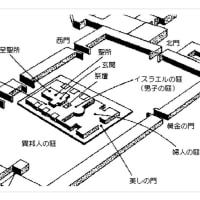146篇 主に望みを置く
1.文脈と背景
この詩篇から、最後の150篇までは、ハレルヤで始まり、ハレルヤで終わる、いわゆる「ハレル詩篇」と呼ばれているものです。ギリシア語の七十人訳聖書では、「ハガイとゼカリヤのハレルヤ」と表題が付けられていて、これまでの流れからしても捕囚期後に作られたと考えられています。
さて「主をほめたたえよ」と詩人は読者に呼びかけます。複数形で、会衆全員への呼びかけです。一時的な気分によらず、生涯に渡って(2節)ほめたたえよ、と言います。それは、主こそが、私の人生の根源であり、私の生涯にわたる支え手であるからだ、と確信しているからです。
3節「君主を頼みとしてはならない」、唐突な印象のようにも思われますが、これは人間よりも、主を頼りにせよ、ということでしょう。確かに、どんなに偉大な指導者であっても、どんなに頼りに思える隣人であっても、人の助けはあてにならないと考えたいものです。実際にそうではないでしょうか。
一説に、この箇所の背景に、捕囚帰還後、エルサレムの城壁を再建していた時の出来事があったと言われています。つまり、その時、ユダヤの指導者たちは、城壁再建の妨害工作を行う敵方の貴族と通じて、便宜を図っていたと言うのです。それは、皆のために働いてくれていると思われていた自分たちのリーダーが、敵側の貴族と通じていたという、思いもよらぬ裏切り行為でした。上層部は、腐敗し、多額のお金を分け合い、安逸をむさぼり合っていたのです。しかもそれは、世俗の社会で起こっている問題ではありませんでした。いわば神の民と言われる者たちの上層部に起こっていた問題でした。
しばしば、人間のリーダーシップには、そのような腐敗があったりするものです。人間は信頼すべきものですが、人間というのはどこか不完全、罪人であると、弁えのある理解をしておく必要があるのでしょう。信頼すべきは神のみであり、神につながり、狂いの無い目をもって人生を歩んでいくことです。
2.主に望みを置く
ぶれない人生に必要なのは、主に望みを置くことです。それは、信仰の世界だけのことではありません。信仰とは関係のない一般社会においても、いつでも主の目に見えない支配を覚え、主の足跡に従う歩みをすることです。いつでも人生の主とすべきは、創造の主、「天と地と海、またそれらの中のすべてのものを造られた方」(6節)です。耳があっても聞こえない、目があっても見えない、口があっても語ることのできない偶像の神ではありません。目には見えませんが、確かに、ヤコブという個人に自分を表し、エジプトで虐げられたイスラエル人を解放し、盲人の目をあけ、かがんでいる者を起こされる生きておられる神です。
そのお方こそ、真の正義を貫かれるお方です(6節)。主こそ、正しい統治をなされるお方です。ですから、教会はもちろん、会社や学校、どんな組織にあっても、目に見える権威をも支配しておられる神に目を向けることです。
たとえば、今の職場でうまくいかない、じっと忍耐の時を持っていたところ、上司が変わるとなったら、人はどうするか?おそらく、今度こそ、と新しい上司に期待することでしょう。しかしそうではない、上司を変えてくださった神の深い御心を考えることなのです。そして、神がこの状況をどのようにされるのかと静かに物事の成り行きを見ていくことなのです。そうすれば、その新しい秩序をどのように過ごせばよいのかもわかります。そして人に振り回されることもありません。神こそが、人の一生の歩みに目を配り、配慮し、支えてくださるお方です。神は死んだ者の神ではありません。生きた者の神です。いつでもこのお方を信頼し、賛美しつつ歩みましょう。では今日もよき一日となるように祈ります。
<クイズコーナー>
最初に、昨日のクイズです。詩篇の並行法で、一行目と二行目の思想が、反対、対比、または対照になっているものを何と言うでしょうか。①同義型並行法、②反意型並行法、③合意型並行法。答は②反意型並行法でした。詩1:6「まことに、正しい者の道は主が知っておられ、悪しき者の道は滅びる」がそのよい例です。では、今日の聖書クイズです。詩篇の並行法の中で、一行目と二行目の思想の間に、補足完成されるものがある並行法を何というでしょうか。①同義型並行法、②反意型並行法、③合意型並行法、答えはまた明日。では今日もよき一日となりますように祈ります。
Psalms 146: Putting Our Hope in the Lord
1. context and background
From this Psalm to the last 150 Psalms are the so-called "Hallelujah Psalms," which begin and end with Hallelujah. In the Greek translation of the Bible of the Septuagint, it is entitled "Hallelujah of Haggai and Zechariah," which, based on previous trends, is thought to have been composed after the captivity period.
Now, "Praise the Lord," the poet calls out to his readers. In the plural, it is an invitation to the entire congregation. He says, "Praise Him, not according to your temporal moods, but throughout your life (v. 2). I am convinced that this is because the Lord is the root of my life and my lifelong sustainer.
Verse 3, "Do not rely on monarchs," may seem abrupt, but this must mean that we should rely on the Lord rather than on human beings. Indeed, we would like to think that we cannot count on the help of others, no matter how great a leader they may be or how dependable a neighbor they may seem. Indeed, isn't that the case?
One theory is that the background of this passage is the events that took place when the walls of Jerusalem were being rebuilt after the return of the captives. In other words, at that time, the Jewish leaders were working for the benefit of the enemy aristocrats who were sabotaging the rebuilding of the city walls. It was an unexpected betrayal that their leaders, who were supposed to be working for the good of all, were in communication with the nobility of the enemy side. The upper echelons were corrupt, sharing large sums of money, and devouring each other's wealth. This was not a problem in a secular society. It was a problem in the upper echelons of God's people, so to speak.
Often, there is such corruption in human leadership. Human beings are to be trusted, but it is necessary to understand that human beings are somehow imperfect and sinners. God alone is to be trusted, and we are to connect to Him and walk through life with eyes that are clear.
2. set your hope in the Lord
What is necessary for an unshakable life is to place our hope in the Lord. This is not just for the world of faith. Even in the general society that has nothing to do with faith, we must always remember the Lord's invisible rule and walk according to His footsteps. The Lord of life at all times should be the Lord of creation, "He who made the heavens and the earth and the sea, and all things in them" (v. 6). He is not an idol God who has ears but cannot hear, eyes but cannot see, and a mouth but cannot speak. He is a living God who cannot be seen, but who, indeed, expresses himself in the individual Jacob, who liberates the oppressed Israelites in Egypt, who opens the eyes of the blind and raises the crouching ones.
He is the One who is truly just (v. 6). He is the One who "opens the eyes of the blind and raises the blind and bends down, who loves the righteous, protects the sojourner, and upholds the widow and the widower. The Lord is the one who rules righteously. Therefore, we must look to God, who rules over the visible authorities in any organization, whether it is a church, a company, a school, or any other organization.
For example, if things are not going well at your current workplace, and you have had a time of patience, what will you do when your boss changes? Perhaps they will hope that this time, the new boss will be the one. But not so, it is to consider the deep will of God who changed the boss. And then quietly watch how things turn out, wondering what God will do with the situation. Then we will know how to live in this new order. And we will not be pushed around by others. God is the one who looks after, cares for, and sustains the steps of a person's entire life. God is not the God of the dead. He is the God of the living. Let us always trust in Him and walk in praise. I pray that today will be another good day.
<Quiz Corner
First, yesterday's quiz. What do you call a parallelism in the Psalms in which the thought of the first line and the second line are opposite or contrasting? (1) synonymous parallelism, (2) antonymous parallelism, and (3) consensual parallelism. The answer was (2) antonym-type parallelism. A good example is Psalm 1:6, "Truly the Lord knows the ways of the righteous, but the ways of the wicked will perish. Now, here is today's Bible quiz. What is the name of the parallelism in the Psalms that has a supplemental completion between the first and second line of thought? (1) synonymous parallelism, (2) antonymous parallelism, (3) consensual parallelism, and the answer will be given tomorrow. Well, I wish you a good day.



















